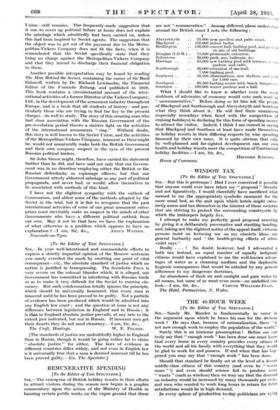THE MOSCOW TRIAL.
[To the Editor of THE SPECTATOR.] ,Sin, =Your,. leading article on this subject fairly presents the whole issue, but omits reference to one , cardinal fact which may have inspired the trial. The charges made by the Soviet Union were :
(a) That, inspired . either by the British Government or the Metropolitan-Vickers . Company, employees . of, that company had carried on espionage work and sabotage in connexion with the. electrical plant that they were erecting ; . and .
(b) That bribery and corruption had been adopted in securing these results. .
Sir John Simon's specific statement in. the House of Com- mons that the British Government had never directly nor indirectly employed. any of the prisoners .for espionage or sabotage work would appear to dispose finally of Government association with the prisoners, and the fact that the Soviet Union stated at the trial that they made no charge against the Metropolitan-Vickers Company makes it clear that officially they were not responsible for any alleged criminal action of their British employees.
The real problem—why the charges were first made and what the 'motive was for the trial in the mind of the Soviet
Union—still remains. The frequently-made suggestion• that it was to cover up political failure at home does not explain.
the sabotage which admittedly had been carried on, unless this had been inspired by Soviet agents. The suggestion that the object was to get out of the payment due to the Metro-
politan-Vickers Company does not fit the facts, when it is remembered that the Soviet -specifically state that they bring no charge against the Metropolitan-Vickers Company and that they intend to discharge their financial obligation: to them.
Another possible interpretation may be found by reading- The Man Behind the Scenes, containing the career of Sir' Basil. Zaharoff, written by Dr. Richard Lewinsohn, the-Financial Editor of the Vossische Zeitung,' and published in '1929.
This book contains a circumstantial account of the inter-' national activities of a former Director of the Vickers ComPany; Ltd., in the development of the armament industry throughout Europe, and is a book that all students of historyand par- ticularly those who are trying to find the key to the present charges—do well to study. The story of this amazing man who had close association with the Russian Government of the pre-revolution period throwsi a sinister light on the activities of the international armaments " ring." Without doubt, this story is well known to the Soviet Union, and the activities of the Metropolitan-Vickers NniPany, innocent as these might be, would not unnaturally make both the British Government and their own company suspect in the eyes of the present.
Russian political leaders. . , • - - - Sir John Simon might, therefore, have carried his statement further than he did, and have said not only that our Govern- ment was in no direction employing either the British or the Russian defendants, as espionage officers, but that our Government utterly abhorred sabotage as any part of political propaganda, and never had, or would, allow themselves to be associated with methods of this kind.
I have not the slightest sympathy with the outlook of Communism, and abhor some of the methods adopted by the
Soviet in the trial, but it is fair "to recognize that the past
international activities of some Of our great armament enter.:, prises must inevitably make us suspect in the minds of other Governments who have a different political outlook from our own. May it not be that here we have the explanation of what .otherwise is a problem which appears to have no explanation ?—I am, Sir, &c., ANGUS WATSON. Newcastle-an-Tyne.







































 Previous page
Previous page